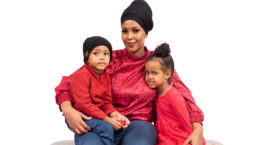How the Mind, Body, and Culture Program is supporting East African parents to build better parent-child relationships.

Somali parents express their love for their children through actions and gabay (poetry). If they could move mountains for their children, they would. Many Somali parents migrate to western countries with the hope of a better life for their children. However, they often sacrifice their own desires to allow their children to build a beautiful tomorrow. In doing so, they also tend to let their mental health slip through the cracks. This is where Voices of Tomorrow (VOT) comes in with the Mind, Body, and Culture (MBC) program, which is the first and only program of its kind aimed at promoting parent mental health in the East African community because VOT understands the cultural barriers that these parents face when it comes to merging their new world with their already existing one. The program helps parents understand that putting themselves first allows them to become better equipped to take care of their children.
Dahabo Khalid, a mother who has been working with the MBC program for over a year, shares that when she began this program she was always on the go, and rarely took time for herself. She describes how most Somali parents consider attending a wedding or family gathering as taking time for themselves. Now, almost two years later, Khalid makes time for herself weekly with the encouragement of her home visitor. She takes herself to the salon regularly, recently she went to a private steam room with her friend as a mom’s night out event. The MBC program, however, goes deeper than just surface-level aesthetic self-care.
An important skill Khalid learned through this program was understanding ways to grow the bond between her and her daughter. Every week, Sahra Abdullahi, an MBC home visitor, and Khalid work through a parent-child handout. This week, by using a handout focused on encouraging cooperation in everyday moments, Abdullahi was able to help Khalid understand that learning her child’s personality trait is key to a successful parent-child relationship. Sometimes, children are seen as just children, but it is important to really understand your child’s individuality. Learning the things, they like and do not like allows you to communicate with your child the way they need. Khalid learned that treating all children the same way is not effective, and understanding their uniqueness enhances the parent-child relationship.
Another takeaway for Khalid from these handouts was setting clear expectations and flexible limits. This means the child’s age needs to be considered when setting expectations for them and adjusting it accordingly as they grow older. Giving them choices to build their confidence and feel independent is equally important, even at an early age. Many parents view a protest as rebellion, but the home visitor helped Khalid see the world through her child’s eyes. Abdullahi showed Khalid how easy it is to resolve things with children through proper communication.
She used an example of a child who was doing arts and crafts. After a few minutes, the mother saw the child drawing on the wall. Instead of raising her voice, the mother asked her child, “What led you to draw on the wall?” The child answered, “My paper wasn’t big enough.” After analyzing this story, Khalid understood that all actions are not a sign of rebellion; the child saw a blank canvas where she could continue to draw. Abdullahi said, “At the end of the day, it’s important to understand your child is also their own person and they want their ideas to be valued.”
When kids throw tantrums, it is important to have conversations so they can understand you and so you can better understand them. Khalid said the MBC program taught her more than how to be a mother. “I already know how to do that because I’m on my third child,” she said. “What this program has allowed me to do is understand my children better and how to engage with each one of them accordingly.”
The MBC program not only supports parents’ mental health and encourages parent-child bonding, but it also assists parents by providing essential materials they need to take care of their children. MBC partners with Eastside Baby Corner (EBC), a non-profit organization that works with local agencies to bring essentials to local children living in poverty and crises, to order free diapers, strollers, car seats, milk, and many other items that would aid the parents in caring for their child. The previous program Khalid was a part of was more child-focused, but when MBC began working with EBC early last year, Khalid was delighted and surprised that her home visitor could provide her with the necessary and practical items she requested. For example, she received a brand-new pink car seat that was a perfect fit for her daughter. The benefits of this program go beyond just Khalid and her household, as it teaches a community how to foster communication with children while not forgetting to take care of themselves.